EVM Experience: Not smooth sailing at all
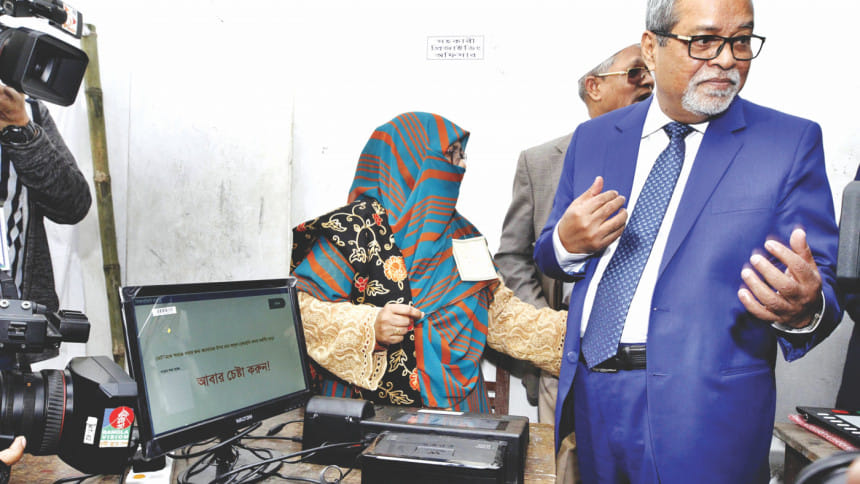
For most, it was the first EVM experience and for many, the experience was not pleasant.
While promoting the EVM (electronic voting machine) use in the Dhaka city polls, the Election Commission said it would be convenient, less time-consuming, and free from manipulation.
The EC had used the machines on limited scale in previous polls but yesterday’s one was the first major all-EVM election.
Witness accounts and most of the voters The Daily Star talked to at different polling centres yesterday cast a grim picture.
Many complained of not being able to vote as the fingerprint scanners failed to identify them, unwanted “helpers” cast their votes instead, and no privacy in the polling booths. The Daily Star got many of these complaints from over 100 centres its reporters visited.
Chief Election Commissioner KM Nurul Huda’s fingerprint did not match the one in the database when he tried to cast his vote at a polling station in Uttara yesterday morning. He eventually voted using his national ID card number.
The CEC was lucky to have been able to cast his vote. The Daily Star got many complaints from voters who were unable to cast their votes due to fingerprint mismatch. This paper’s executive editor was one of those who were not allowed to vote as the machines failed to read the fingerprints.
“I could not cast my vote. Someone cast it for me,” a voter told this correspondent in front of Gandaria High School polling centre around 11:30am.
This correspondent, also a voter at that centre, then went into the polling centre, which is in Dhaka-6 constituency where EVMs had been used in the 2018 national polls.
When this correspondent reached the polling booth on the third floor, he saw five people standing in line to cast their votes.
As a voter approached the booth, an unwanted “helper” sporting a card around his neck with the symbol of boat and Dhaka South Awami League candidates’ pictures, entered the booth before him.
The voter and the “helper” were seen and heard exchanging heated words.
“What’s the point of this kind of farce? I should not have come to vote,” the man was heard saying as he left.
Apparently disheartened by seeing a fellow voter’s vote being cast by the unwanted “helper”, some of the voters who were in the queue started leaving without casting their votes.
Asked, one of them said, “I will not allow someone else to cast my vote against my will. It is better to not vote.”
After completing his biometric clearance, a voter in his 40s engaged in a heated exchange with the “helper” and at one stage told officials that he won’t cast his and left fuming.
No sooner the voter had left, the “helper” went inside the booth and cast the votes.
Ahead of a five-person queue was an elderly philanthropist of the area. Following 10 minutes of trial and error, he got biometric clearance to vote.
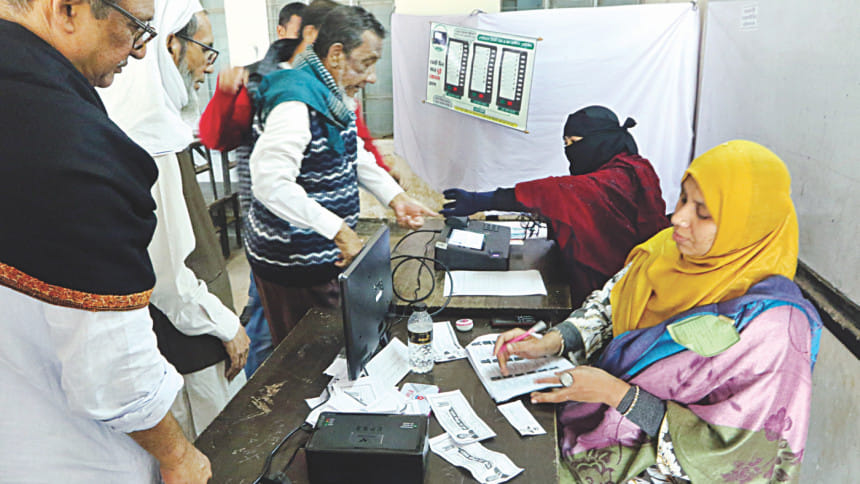
But when he was casting his vote, the unwanted “helper” was keeping an eye over the barely shoulder-height black curtain at the booth.
When this reporter went to cast his vote, a leader of the ruling party’s youth front shouted from a distance. “He is a big brother of our neighbourhood. Let him cast his vote.”
A first-time EVM voter shared his experience to this correspondent afterwards.
“I told him [unwanted “helper” inside the booth], ‘Let me cast my vote’,” the voter said.
“Of course, I’m here to help you choose the ones to vote for,” the voter quoted the man as saying.
At Kids International School in PC Culture Housing, Adabor, a woman complained that a polling officer cast her vote pretending to fix a broken machine.
“After I selected the first candidate, the machine stopped working. The polling officer then entered the booth and said ‘let me help you and cast the votes’,” said the woman, adding that the officer stole the next two votes on the ballot pretending to fix the machine.
The privacy required for casting votes seemed to be scarce.
Most of the voters said they felt embarrassed.
When a voter cast their vote, it remains on the screen for quite a while allowing people in the station to sneak a peek.
Around noon at Ideal School and College of Rampura, a heated exchange ensued after a woman protested AL supporters’ illegal interference. The woman told The Daily Star that the AL supporters were peeking into the booth to see who she was voting for.
Some aggrieved women also made similar complaints at New Model Degree College polling centre.
They said the ruling party men wanted to see who they were voting for.
At Little Star KG and High school in Badda, Chand Mia said it took 10 minutes to cast his vote and that he felt it was easier to vote without the EVMs.
The presiding officer of the centre Mohammad Mohiuddin said most of the voters there were labourer and many of them went to vote with scratches on their thumbs, making it difficult to read the fingerprints.
Over the last 10 years, the EC used EVMs on a small scale in local government elections and in one constituency in the last parliamentary polls.
The use of EVMs was marred by controversy before the 2019 parliamentary election in India when opposition political parties claimed that the machines were susceptible to manipulation and tampering.
The Indian EC then introduced voter verifiable paper audit trail (VVPAT) or verifiable paper record (VPR).
Germany, the Netherlands and Ireland have stopped using the machines after security flaws triggered debates.
What CEC said Chief Election Commissioner KM Nurul Huda claimed that voting for someone else was not possible with EVMs.
Regarding the allegations of voters that someone had voted for them after the biometric clearance, the CEC, speaking to reporters at the Nirbachan Bhaban in Sher-e-Bangla Nagar in the evening, said the EC did not get any such complaints.
He claimed that no voter who went to the polling centres returned without casting their votes.
Speaking to The Daily Star after his biometric clearance failure, Huda said, “As my fingerprint was taken eight to nine years ago, it may not match. It may not match even if your finger tips are moist,” he added.
“Such problems may arise, but no one will go back home without casting his or her vote,” he said, adding that there are three to four ways to cast votes. He however did not elaborate.

 For all latest news, follow The Daily Star's Google News channel.
For all latest news, follow The Daily Star's Google News channel. 


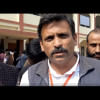
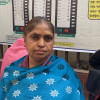
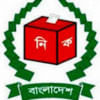
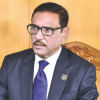

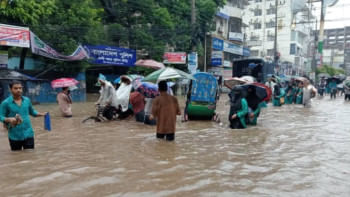
Comments